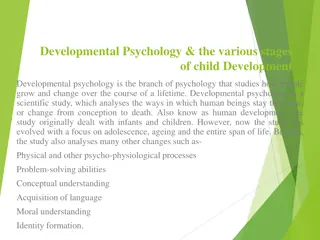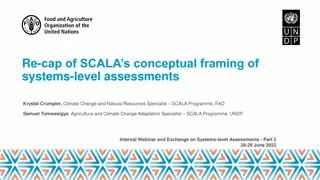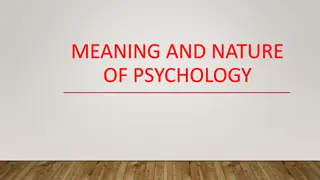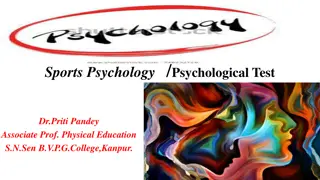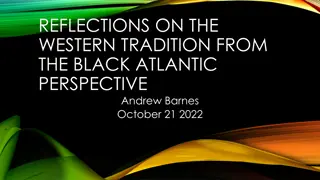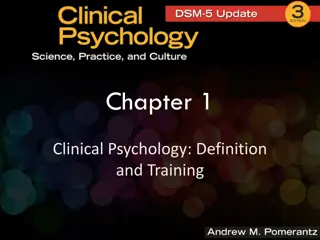Exploring Transformational Psychology Through History and Tradition
Transformational psychology delves into the spiritual and emotional transformation required for understanding psychology in the context of faith and relationship with God. It contrasts naturalistic approaches with the spiritual foundation, emphasizing the importance of combining science and psychology with love and faith. The narrative examines the fall of humans, the sinful nature, and the pillars essential for conducting psychology within tradition and reality. By exploring psychology within historical and cultural contexts, the evolution of psychological theories like Freud's psychoanalysis and the cognitive revolution of the 1950s and 1960s are highlighted.
- Transformational Psychology
- Spiritual Transformation
- Human Fall
- Historical Context
- Cognitive Revolution
Download Presentation

Please find below an Image/Link to download the presentation.
The content on the website is provided AS IS for your information and personal use only. It may not be sold, licensed, or shared on other websites without obtaining consent from the author. Download presentation by click this link. If you encounter any issues during the download, it is possible that the publisher has removed the file from their server.
E N D
Presentation Transcript
Transformational Psychology
Thesis statement: An act of love Doing science and psychology is ultimately an act of love. The spiritual-emotional transformation of the psychologist is the foundation for understanding, developing and preserving the (1) process, (2) methodology and (3) product of doing psychology in the Spirit.
The fall of humans and our sinful nature After the fall of humans, sin clouds our view. Now we do psychology naturalistically in terms of methodology, manner and outcomes without a relationship with God. It is similar to Calvinism: Total depravity (total inability) people are, as a result of the fall, not able to love God wholly with heart, mind, and strength, but rather are inclined by nature to serve their own will. What is the problem in this position?
Five pillars in the foundation 1. The person doing psychology within a history or tradition of psychology. 2. The person doing psychology anew in the Spirit. 3. The person doing psychology grounded in reality, including the realities known by faith. 4. The person doing psychology as one, single, yet complex, study of reality in faith, 5. The person doing psychology as a science that is both descriptive and prescriptive in nature
Doing psychology within a tradition We cannot do science by cutting off the past or ignoring the cultural or historical context. What seems right may be contextual. Sigmund Freud s psychoanalysis focuses on how human internal forces (e.g. sexual drive) influence our behaviors. When certain drive is suppressed, this drives would find a way out.
Doing psychology within a tradition During Freud s life time, the dominant technology was steam power. When you suppress the steam, the force would find another channel to get out. Freud was influenced by a scientist named Herman Von Helmholtz. Freud was fond of the thermodynamics of steam power.
Doing psychology within a tradition During the 1950s and 1960s there is a cognitive revolution in psychology. Ulric Neisser's 1967 book Cognitive Psychology. During that time the dominant technology was computer science. Cognitive scientists tried to use computational models to study human mental processes. https://www.youtube.com/watch?v=AeoyzqmyWug
The central vision of doing psychology anew in the Spirit The dominant paradigm of psychology is unfair to Christians. John Rawls s A theory of Justice Get behind the veil We suspend our commitment to any tradition or establishment; rather, we try to restore the default or the original positon to think it over. https://www.youtube.com/watch?v=5- JQ17X6VNg Think anew: What would psychology look like without certain traditions?
Doing psychology grounded in reality and the realities of faith: The relevant sources Doing psychology anew by grounded it in reality, including those realities understood by faith (e.g., original sin, the ministry of the indwelling Holy Spirit, the demonic). Is this point and previous one contradictory? The authors used the term Christian realities. Is it the same as Christian tradition?
Doing psychology as a single, unified vision of reality in faith Transformational psychology is uniquely committed to a single, unified methodology that is capable of providing a science or psychology of both created and distinctively Christian realities for it makes no distinction between them methodologically. The question is no longer the relationship of X and Y. X and Y are one single entity!
Commitment to a non-naturalistic methodology in science and psychology It clearly rejects any view of science embracing a naturalistic methodology that precludes the study of certain realities from its domain.
Doing psychology as a descriptive and prescriptive science Transformational psychology rejects that: Scripture is the only place for finding wisdom or prescriptions for living well in God Psychology and its scientific methodology are solely descriptive in nature. Wisdom in the Old Testament
The love thesis Doing psychology well is to do it as a form of love, of contemplation and loving of God in the very act of studying persons. It is also a form of neighbor love in God. Anything less is a form of academic dysfunction and curiosity. In that sense, the nonbeliever is unable fully to do psychology well and, thus, is in part dysfunctional as a psychologist. The reason is clear: the unbelieving psychologist does not study as he or she ought for the love of God or for the purpose of realizing his or her potential in the love of God and neighbor-love (p.214). Agree or disagree? Please go to four corners.
Summary After the fall of humans, our intellectual inquiry is based upon a naturalistic assumption without a relationship with God. Scientific inquiry is tied to historical and cultural contexts. Being restricted by a particular tradition is unfair. To be fair, we need to get behind the veil so that we can evaluate psychology anew. In psychology we have to take Christian realities into account. We should talk less about the relationship between psychology and faith. They should be a single entity. Doing science and psychology is an act of love. Non-believers cannot fully do well in psychology because they don t have the love of God.
Response by David Meyers Is the transformational psychologist doing something other than psychology? Indeed yes: he or she is doing religion. A non- naturalistic methodology in science is non- science in science; it s a contradiction in terms.
Response by Robert Roberts There is no clear or strict line between spiritual and psychological well-being, or between spiritual and psychological knowledge. It is possible for a non-Christian to live a good life (enjoy psychological well-being without spiritual well-being). But, what is spiritual?
My response Is psychology only about well-being? Can a cognitive psychologist study human mental structure and process for the sake of knowing without love? Can a quantitative psychologist or a psychometrician study certain statistical methods for the sake of scientific without love? My example: http://www.creative- wisdom.com/pub/pub.html






